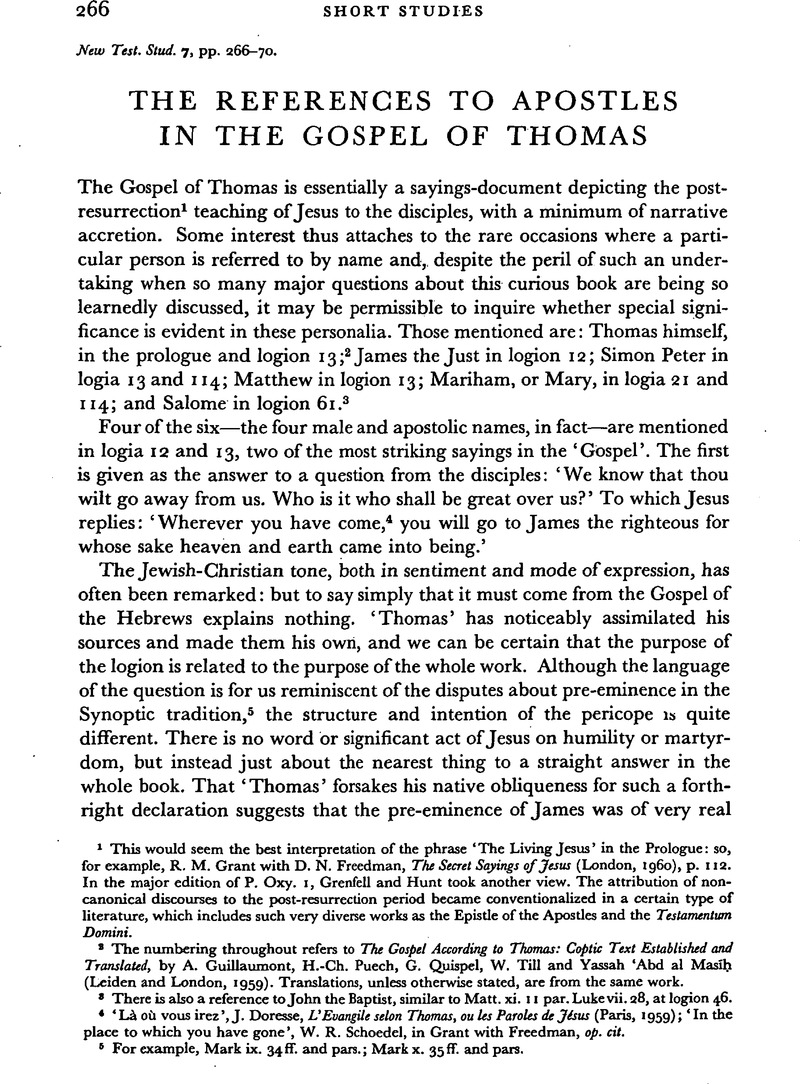No CrossRef data available.
Article contents
The References to Apostles in the Gospel of thomas
Published online by Cambridge University Press: 05 February 2009
Abstract

- Type
- Short Studies
- Information
- Copyright
- Copyright © Cambridge University Press 1961
References
page 266 note 1 This would seem the best interpretation of the phrase ‘The Living Jesus’ in the Prologue: so,for example, R. M. Grant with D. N. Freedman, The Secret Sayings of Jesus (London, 1960), p. 112.In the major edition of P. Oxy. 1, Grenfell and Hunt took another view. The attribution of non-canonical discourses to the post-resurrection period became conventionalized in a certain type ofliterature, which includes such very diverse works as the Epistle of the Apostles and the TestamentumDomini.
page 266 note 2 The numbering throughout refers to The Gospel According to Thomas: Coptic Text Established and Translated, by Guillaumont, A., Puech, H.-Ch., Quispel, G., Till, W. and Yassah, 'Abd al Masīh ( Leiden and London, 1959). Translations, unless otherwise stated, are from the same work.Google Scholar
page 266 note 3 There is also a reference toJohn the Baptist, similar to Matt. xi. ii par. Lukevii. 28, at logion 46.
page 266 note 4 ‘Là où vous irez’, Doresse, J., L'Evangile scion Thomas, ott irs Paroles de Jésus (Paris, 1959); ‘In the place to which you have gone’, W. R. Schoedel, in Grant with Freedman, op. cit.Google Scholar
page 266 note 5 For example, Mark ix. 34ff. and pars.; Mark x. 35ff. and pars.
page 267 note 1 Philos. v. 7.Google Scholar
page 267 note 2 Op. cit. p. 140.Google Scholar
page 267 note 3 The Coptic has transliterated Φιλόσοϕος.
page 267 note 4 Especially, ‘Notes on the Gospel of Thomas’, Vig. Chr. XIII (1959), 170–80.Google Scholar
page 267 note 5 Thomas Evangelist: Indiedning, oversttelse og kommentarer (Copenhagen, 1959), p. 48.Google Scholar
page 268 note 1 op. cit. pp. 141f. His translation of the passage, as given partly on p. 39 and partly on p. 142 is: ‘Le Sauveur, frére de Thomas, lui a dit… Ecoute; je te révélerai ce a quoi tu penses dans ton cœur: comment l'on dit que tu es véritablement monjumeau et ma compagnon; comment tu sais qui tu es et de queue manière tu as été engendre et de queue façon tu deviendras; comment l'on t'appelle mon frère.…’Google Scholar
page 268 note 2 Logion 1.
page 268 note 3 It may be noticed in passing that the invocation in Acts of Thomas xlvii, which clearly alludes to the incident, is inconclusive as to its interpretation. The address is to Jesus as Mystery Revealed and as Revealer of Mysteries, but Judas Thomas goes on ‘Thou that didst call me apart from all my fellows and spakest unto me three words wherewith I am inflamed, and am not able to speak them unto others…’ The reference to Jesus as Mystery is balanced by Thomas' high sense of his own unique experience. M. Doresse's linking of the Three Words with the words quoted from the unpublished Book of Thomas is suggestive and very attractive: but without the whole book, and the context of the passage he quotes, it is dangerous to venture further. Dr Grant's suggestion has the great merit of reflecting something independently known of Naassene practice: is it reconcilable with an investiture of Thomas?
page 269 note 1 Is Thomas, rather than Jesus, the speaker in logion 1?
page 269 note 2 Adv. Haer. III, especially 1–4, 9 (Harvey II, pp. 1 ff.)Google Scholar
page 269 note 3 Origen, , C. Gels. V. 62: a ‘Harpocratian’ sect. Cf. Clem. Alex. Exc. ex Theodoto, lxvii. 2.Google Scholar


